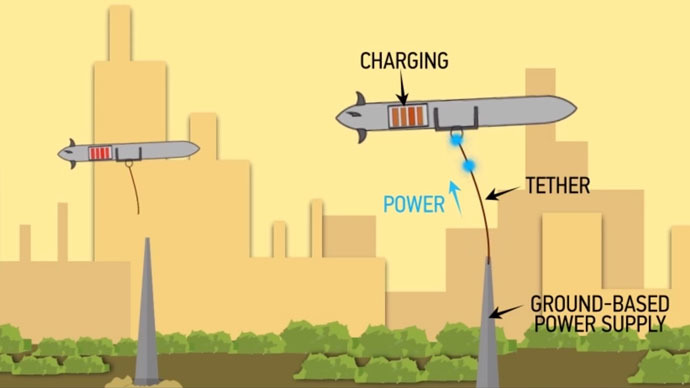As drone technology continues to advance, Boeing has raised the bar even higher. The aerospace giant has received a patent for a UAV that could fly forever – recharging in mid-air via a tether attached to the ground.
The patent – filed in March 2013 and approved by the US Patent and Trademark Office last week – could revolutionize unmanned aerial vehicles (UAVs) as we know them, foregoing the need to refuel or recharge on land.
READ MORE: No Drone Zone: FAA reminds tourists skies over DC are restricted
According to the patent, the electrically-powered drone would have a retractable tether cable that would connect to a power source. When the drone was fully charged, it would automatically fly off to continue its task, and another UAV could then take its place at the charging station.
The drone could be connected to a number of sources, including land- and sea-based power supplies. It could even be connected to moving vehicles, allowing the drone to fly while charging.
The concept could be extremely beneficial for drone delivery services, or for those which need to stay airborne for an extended time due to long-term experiments, monitoring or travel, GeekWire reported. It could also completely do away with landing gear, which can be heavy and burdensome for drones.
This video from PatentYogi shows how the drone could stay up all day long.

Boeing has so far given no indication on whether it actually plans to build the drones.
An increasing number of companies are currently testing drones, indicating that widespread usage could be just around the corner.
As was reported last week, NASA and Verizon are investing in new technology that would use already existing cell phone towers to monitor civilian and commercial drones.
READ MORE: Green side of drones: Flying bots may plant 1 billion trees a year
In April, Amazon was granted the authority to test delivery drones in the US. The e-commerce giant hopes to revolutionize delivery services with the technology. That same month, the US Federal Aviation Administration (FAA) approved the testing of UAVs by three insurance giants: AIG, State Farm and USAA.
The FAA has already come under fire for its alleged lack of privacy protections in its initial set of drone regulations. In April, the Electronic Privacy Information Center (EPIC) filed a suit against the agency, asking a federal appeals court to review its decision.
At present, the FAA prohibits commercial drone operators from flying drones beyond their line of sight, and restricts their use to daylight hours. Drones must weight a maximum of 55 pounds, stay below 500 feet in the air, and fly less than 100 miles per hour. A drone operator must also pass an aeronautics test.

